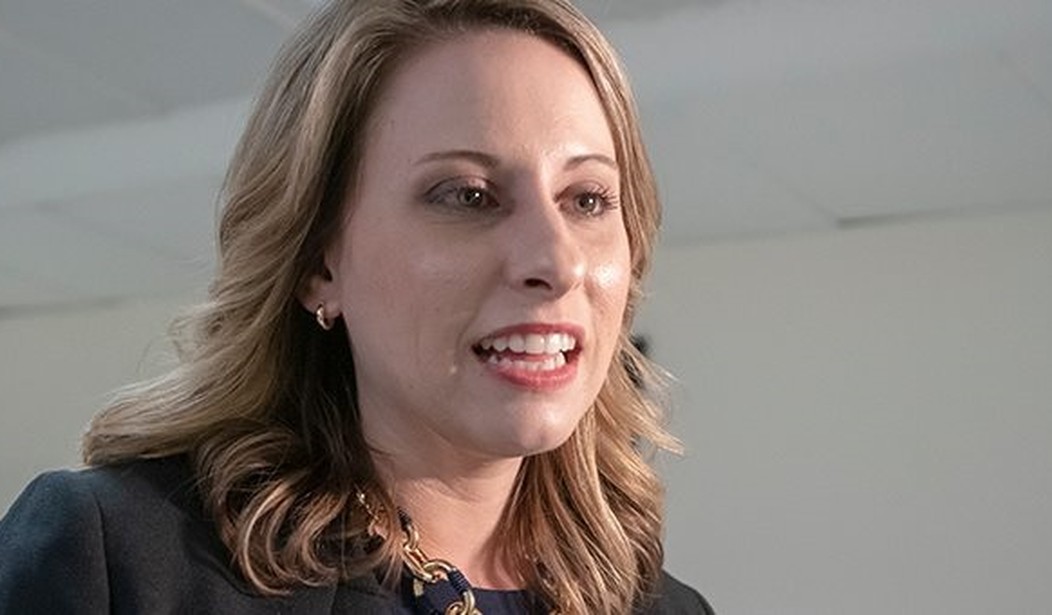These are important correctives in a media cycle where everyone else seems investing in promoting Katie Hill’s marketing as a pure victim of Teh Patriarchy. The talking points about the now-former congresswoman’s pushback against “double standards” and the “misogynistic culture” went far and wide after her “fiery speech” and “defiant resignation” on the House floor yesterday.
But what exactly was the “double standard”? Hill didn’t get forced into resigning for having taken nude pictures (or forced into it at all), but instead was under investigation for sleeping with subordinates — a violation of House ethics rules. Is it true that men wouldn’t be held to the same standard? NPR reporter Susan Davis thinks not, and suspects that Hill’s resignation had more to do with stopping even worse from emerging:
If anything, the horrible leak of nude photos made her a more sympathetic figure than a man (ask Joe Barton), she found allies in the other party, no one was calling for her to resign. Resigning does, however, stop an ethics investigation, a historically male thing to do.
— Susan Davis (@DaviSusan) November 1, 2019
The Joe Barton reference is particularly apt. When the pictures of Hill emerged, the media rallied around her as a victim of “revenge porn,” but they had a much different reaction to a similar set of circumstances with Barton. Only later did they grudgingly acknowledge that Barton may have been victimized by a former paramour, about the same time Congress took up the issue, but by that time Barton announced his retirement from politics. If there was a House standard on revenge-porn embarrassment, it looks pretty evenly applied so far. There was a media double standard, but it didn’t cut against Hill — quite the opposite.
That isn’t why Hill faced an Ethics Committee probe, however. It’s because she had sexual relations with subordinates, for which the pictures were evidence. Others point out that Republican Rep. Duncan Hunter remains in Congress while having faced similar accusations in his past. Isn’t that a double standard?
Hunter began a romantic relationship with one of his staffers not long after she joined his office in January 2015, according to the Justice Department. And he had a three-year relationship with an aide to another lawmaker in congressional Republican leadership after they met at the Republican National Convention in 2012.
The relationships were revealed Monday in a motion filed in federal court in San Diego in connection with Hunter’s upcoming trial on felony charges, alleging he misused campaign funds for personal expenses.
Hunter dipped into campaign coffers to pay for drinks out, couples’ trips and Uber rides from the women’s homes to his congressional office, prosecutors say.
A third congressional staffer, Rory Riley-Topping, who at the time was an aide to the House Veterans Affairs’ Committee, told RT America on Wednesday that Hunter groped her while visibly intoxicated at an event in 2014.
Clearly Hunter has bigger problems than Hill, both legally and ethically, but on the standards point there is one clear difference. The House did not explicitly make a rule against sexual relationships with staffers until 2018, in part because of situations like Hunter’s. Katie Hill got elected to Congress with that rule in place, while Hunter’s alleged peccadilloes all took place before the House voted to prohibit such relationships. And let’s not forget that Hunter is presently being prosecuted by the feds for the other allegations mentioned, so he’s not exactly in a better position than Hill today.
The Roll Call piece also recalls why the House wisely amended its rules to prohibit such relationships:
“When you have big power disparities like that … when you are in a position of power over someone’s livelihood, over their career opportunities, consent can get pretty muddy,” said Emily Martin, a vice president at the National Women’s Law Center and an adviser to Congress on the 2018 update to the rules.
“For me, these concerns are heightened when it comes to Congress, because if you’re a member of Congress, you’re one of the most powerful people in the country,” Martin continued.
Katie Hill broke the rule, which was part of a very public and concerted effort to bring Capitol Hill in line with the current #MeToo moment. It’s not as if this was just some arcane regulation and Hill fell victim to a technicality. Hill had the bad fortune to have incontrovertible evidence of it emerge in public, but to refuse to enforce the rule because Hill was sympathetic in that regard would have been to impose a double standard.
That doesn’t make the “revenge porn” part of this story uncompelling, but it’s only part of this story — and not even the main part. Two things can be true at the same time, Washington Post reporter Ashley Parker noted, and equality requires women to handle accountability just the same as men:
Also, two things can be true: Revenge porn is despicable. BUT any lawmaker — male or female — might not have been able to weather this. True equality is female politicians making decisions as irresponsible and arrogant as their male counterparts, and being treated accordingly. https://t.co/o1r6DEQeEi
— Ashley Parker (@AshleyRParker) November 1, 2019
Finally, let’s all remember that Hill resigned on her own. No one in leadership of either party had called for her resignation, as Susan Davis notes, and she even had some bipartisan support in the House, thanks to Matt Gaetz’ surprisingly impassioned defense of her as a revenge-porn victim. One has to wonder why Hill didn’t just let the Ethics Committee probe play out if this was nothing but a double standard. As Davis suggests, the resignation seems like a tacit admission that Hill might not have survived a full probe into her operations. The only standard applied in this case was self-applied. Why?







Join the conversation as a VIP Member